|
Super Rugby
Super Rugby: A history in 10 chapters
Andy Withers
February 5, 2015

© Graham Cousens / Scrum.com
Enlarge
Super Rugby kicked off with 12 teams in 1996 with the ambitious remit to provide high-voltage attacking rugby, and who'd have thought what would happen in Christchurch when the Crusaders finished last in the inaugural campaign? As the tournament prepares to kick-off its 20th season, we look at its development and legacy in 10 chapters. What are your favourite Super Rugby memories? Let us know in the comments below, or by joining the conversation on Twitter using the hashtags #SuperRugbyMemories or #10For20

Zinzan Brooke was key for Auckland in their 1996 and 1997 Super 12-winning campaigns
© Getty Images
Enlarge
Kick-offAuckland Blues defeated Wellington Hurricanes 36-28 in the first Super match in history, in 1996, scoring five tries to one at The Showgrounds in Palmerston North. The match was a portent of what was to come, with the emphasis on fast, attacking rugby with defence seemingly less of a priority. The Blues went on to win the inaugural title, beating Northern Transvaal 48-11 in the final at Eden Park after scoring more points than any other side through the home-and-away season while conceding more than all but two of their 11 rivals - the eight-placed Otago Highlanders and the bottom-placed Canterbury Crusaders. The free-scoring Blues, the franchise formed from traditionally the strongest New Zealand National Provincial Championship side, followed up the following year, defeating the Brumbies, the newest Australian team whose players relished the thought of being outcasts unwanted by New South Wales and Queensland; their victory in the decider in Auckland led us to believe they would extend their New Zealand superiority over the new competition, and they were strong favourites to complete their title hat-trick when they hosted Canterbury in the 1998 final at Eden Park; they had never lost to the Crusaders and had defeated the South Islanders by seven points at Jade Stadium during the round-robin, but the underdogs bit hard to change Super Rugby history when James Kerr scored a last-minute match-winning try. The Blues have since made only one grand final - defeating Canterbury in 2003 - while the Crusaders three-peated on the way to becoming the most dominant Super franchise in history with seven titles.

ESPN columnist Craig Dowd scored the opening try for the Blues in the 1997 grand final against the Brumbies © Getty Images
Enlarge

Canterbury ended Auckland Blues' run of success in the 1998 grand final © Getty Images
Enlarge
UnbeatableThe Crusaders, in 2000, had completed the only title hat-trick in Super Rugby history, to stake a claim for greatness, but the 2002 side might just be the greatest team in the tournament's history - statistically at least - after becoming the only side to record a perfect season. They tallied 469 points in compiling a differential of +205, a total boosted by the barely believable 14 tries and 96 points they posted in rampaging over second-placed New South Wales in the final round; their differential remained the tournament record until, ironically, the Tahs, playing five more matches, bettered the mark by four points in 2014. The 2002 Crusaders finished the campaign with a comfortable 31-13 title victory over the Brumbies, the defending champions, at Jade Stadium; good as the performance was, however, it was just another day in the amazing history of an amazing franchise.

Todd Blackadder celebrates with his hat-trick heroes in 2000 © Getty Images
Enlarge
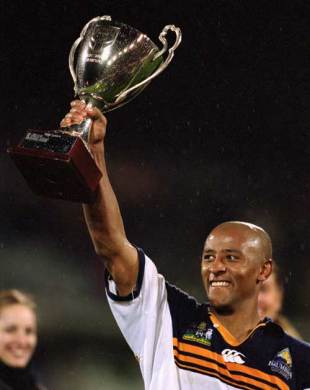
George Gregan shows the spoils of war in 2001, but that was just the first title
© Getty Images
Enlarge
PerfectionThe Brumbies broke through to become the first Australian champions, and the first champions from outside New Zealand, when they defeated the Sharks in the 2001 decider at Canberra Stadium; but it is their second victory, over the powerhouse Crusaders in 2004, that sticks in the memory. The Brumbies produced perhaps the most perfect 20 minutes of rugby seen anywhere in the world - ever - to lead the Crusaders 33-0 midway through the first half; they shredded the visitors' defence with rapier attacks and capitalised on errors with a hurricane performance that blew the visitors off the paddock. The Crusaders couldn't afford to sit and wait for the storm to abate; Robbie Deans replaced Cameron McIntyre at five-eighth with Andrew Mehrtens, and they fought back to score two tries in the second quarter before winning the second half four tries to two. But the Brumbies, dominated in terms of possession, proved by capitalising on every slight sniff of a try that they were the best attacking side in the competition. The Brumbies' starting final line-up - Joe Roff; Clyde Rathbone, Joel Wilson, Matt Giteau, Mark Gerrard; Stephen Larkham, George Gregan; Scott Fava, George Smith, Owen Finegan; Radike Samo, Mark Chisholm; Nic Henderson, Jeremy Paul, Bill Young - gives a clue to their excellence in the decider, the last of three grand finals between the franchises, and the only consideration more amazing than the opening quarter is the fact that this game is just one in a string a barnburners between the teams. The sides have continued to produce rollicking fixtures, and the Brumbies are the only team to have scored 50 points against the Crusaders.

Steve Larkam was instrumental in the Brumbies' opening onslaught in the 2004 grand final © Getty Images
Enlarge

Owen Finegan and the 2004 Brumbies are celebrated to this day in Canberra © Getty Images
Enlarge

The 2006 Super 14 final made for a surreal experience © Getty Images
Enlarge
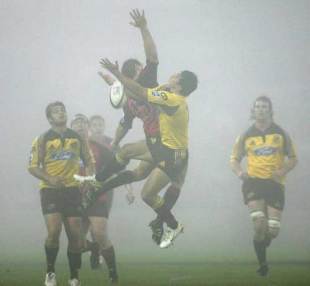
It's hard to catch the pill when you can't see it
© Getty Images
Enlarge
The FogIf a tree falls in a forest and no one is around to hear it, does it make a sound? If a game plays out in a fog and no one can see the pitch, does it take place? The Hurricanes, the great underachievers of Super Rugby, made their only appearance in a grand final in 2006, against the Crusaders in Christchurch, only for a fret to blanket Jade Stadium one hour before kick-off; lead Sky Sport commentator Grant Nisbett said "I cannot see the other side of the field" while live and television audiences alike failed to see anything worthwhile of the hosts' 19-12 victory. Officials said later the game could easily have been postponed by 24 hours. The bizarre nature of the game featured an astonishing post-script when Hurricanes team-mates Chris Masoe and Tana Umaga were involved in the infamous "handbag" incident at a Christchurch bar. Masoe tripped over a man's feet while entering the bar then Umaga took his team-mate aside and began hitting him with a nearby women's handbag. You couldn't make this up. Masoe reportedly then began crying. Adding insult to injury, the back-rower was fined NZ$3000 by the New Zealand Rugby Union after reports that he had subsequently punched another patron at the bar.

Just another day at the office for the (2006) Crusaders © Getty Images
Enlarge

Bryan Habana flew in for the final-winning try of 2007 © Getty Images
Enlarge
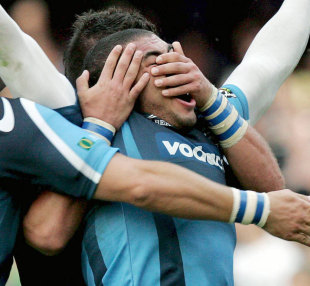
Bryan Habana was the hero of 2007
© Getty Images
Enlarge
Fighting BullsSouth Africa got off the mark in 2007, when the Bulls defeated the Sharks in dramatic fashion to claim the first of their three title wins for the Republic. The Sharks dominated possession and led 19-13 deep into time added-on, but they were left to lament two missed conversions and the decision by Frans Steyn at the death to kick downfield rather than for touch. Bulls captain Victor Matfield, the man of the match, collected the pill and the visitors spread the ball through several phases to Bryan Habana on the right touchline; the winger jinked infield then sprinted through a chasm that had opened in the tired Sharks defence to score close to the goal-posts in the 83rd minute of play. Derek Hougaard had the "simple" task to convert the try and the Bulls made history. The Bulls missed the finals the following year, but the team built around 2007 Rugby World Cup heroes Matfield, Bakkies Botha, Danie Rossouw, Pierre Spies, Fourie du Preez, Habana and super-boot Morne Steyn dominated the 2009 and 2010 seasons, topping the home-and-away ladder and claiming grand final wins over the Chiefs and the Stormers at Loftus Versfeld. In the case of their 2009 victory over the Chiefs, they claimed a barely believable 61-17 victory against a potent team that had finished second on the ladder and had lost to the Bulls by just six points in the round robin only a month previously. You always knew what you were going to get from the Bulls - pretty much you still do - but this side from the late noughties was as good as any in the history of the tournament.

The Bulls won three titles in four seasons © Getty Images
Enlarge
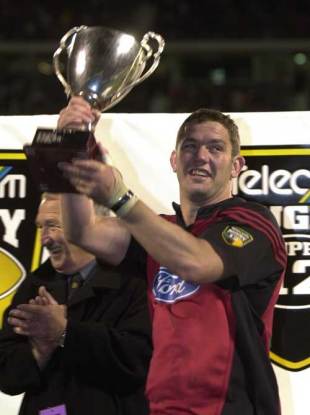
Reuben Thorne, shown after the 2002 final, is the only player to feature in all seven of the Crusaders' title wins
© Getty Images
Enlarge
Seventh HeavenRobbie Deans is the most successful coach in Super Rugby history with 77 victories from 105 matches; hence it was fitting that the Cantabrian finished up with his fifth title, the Crusaders' seventh, before he jetted off to the Promised Land in Australia. The Crusaders lost just twice in 2008, to the Chiefs in round 10 and to the Highlanders three weeks later, but they had to dig far beyond the well to defeat the Waratahs by eight points in the decider. We look back at the final and notice, in particular, that Kieran Read announced himself as a young back-rower going places with a prominent performance, but the Crusaders had to work hard despite a massive advantage in territory and possession; the Waratahs defended stoutly and Lachlan Turner scored two tries against the run of play before the hosts' superior set-piece and rampaging back-row finally produced the victory in the dying stages of the match. This was so different to the 2000 fixture between the sides, and provided a nice prequel to what was to come six years later. The Crusaders were set for a new dawn under a new coach with new names on the roster, but it seems unbelievably that the franchise has not added to its honours in the six seasons under Todd Blackadder. Not that they have fallen off the radar as they still set the benchmark. They have since made two grand finals - in 2011 and 2014, by a collective six points - and they have contested the semi-finals in each of the other four seasons. Surely it's only a matter of time before they lift the silverware once again.

The Crusaders sent Robbie Deans out on a winning note in 2008 © Getty Images
Enlarge

Half a world away ...
© Getty Images
Enlarge
Twickenham: New HorizonsWhat to do when your home is rendered uninhabitable by a devastating earthquake? The indefinite close of AMI Stadium after the February 2011 earthquake that devastated Christchurch was the least of the issues faced by the city, but still it had a major economic impact given the absence of Super Rugby, Test and Rugby World Cup match days. The Crusaders kept on trucking, however, moving their home matches to Nelson, Timaru and London. Yes, London. Twickenham hosted the Crusaders' round six fixture against the Sharks in front of 35,000 spectators, the "Cabbage Patch" becoming the first - and so far only - non-SANZAR venue to stage a Super Rugby match. The Crusaders won 44-28 on the way to yet another grand final appearance - their 10th - but the season failed to deliver a fairy-tale ending … at least not in Canterbury.

Sean Maitland crossed in spectacular fashion for the Crusaders at Twickenham © Getty Images
Enlarge

Ewen McKenzie enjoyed his post-match shower
© Getty Images
Enlarge
Reds RisingQueensland has long been central to Australian rugby success, with fans north of the Tweed often suggesting the national team is strong only when the Reds are strong. But the Reds kicked off the 2010 season under Ewen Mckenzie having gone absent without leave in previous seasons - the 1992 Super 6 champions, two-time Super 10 champions and three-time Super 12 semi-finalists having failed to play in the post-season since 2001. They missed the finals again in 2010, but only by one spot after the Waratahs and the Crusaders had recorded bonus-point wins in the final round of the home-and-away season, and that much improved campaign was a precursor to what would come in 2011. The Reds topped the 2011 minor premiership, with dynamic halves Will Genia and Quade Cooper central to their flamboyant adventure that otherwise featured rampaging runs from Digby Ioane and Scott Higginbotham, and it was fitting that Genia, with a long-range break, and Ioane, with a bulldozing run through space, scored the tries that secured Queensland's maiden title in the decider at Suncorp Stadium. Their campaign in 2011 was wonderful to watch, for it featured the "Australian rugby" that Australian rugby fans dream of seeing, and they were fitting and deserving champions. As for Australia being strong only when Queensland are strong? The Wallabies won the Tri Nations for the first since 2001, when the Reds last made the Super finals …

Will Genia scored the decisive try in the grand final at Suncorp Stadium © Getty Images
Enlarge

Reds captain James Horwill showed what victory meant to Queenslanders © Getty Images
Enlarge
ExpansionSANZAR confirmed in 2014 that Super Rugby would expand to Argentina and Japan in 2016, with the new franchises to play in the South African conference. South African players presently face a four-week swing through Australia and New Zealand, so they're happy as the new conference system is likely to reduce their onerous travel schedule. We're not so sure what players to feature in the Argentine and Japanese teams think of the impressive tally of Frequent Flyer points they're likely to accumulate. SANZAR had planned originally to feature also a team from the United States in the expansion, with hopes of a significantly increased TV deal, but that idea failed to bear fruit as South Africa wanted a sixth team. ESPN hopes fervently that the expansion succeeds, but history has not been kind, in terms of results, to the franchises added to the competition since the original 12-team tournament in 1996. Western Force and the Central Cheetahs joined in 2006, and the competition expanded again in 2011, with Melbourne Rebels entering the fray, but the newcomers to date have made but one appearance in the finals; the Cheetahs made the 2013 play-offs while the Force went close in 2014, when they missed out in the final round. The additional teams have otherwise been considered by fans and punters to be little more than points available to the opposition.
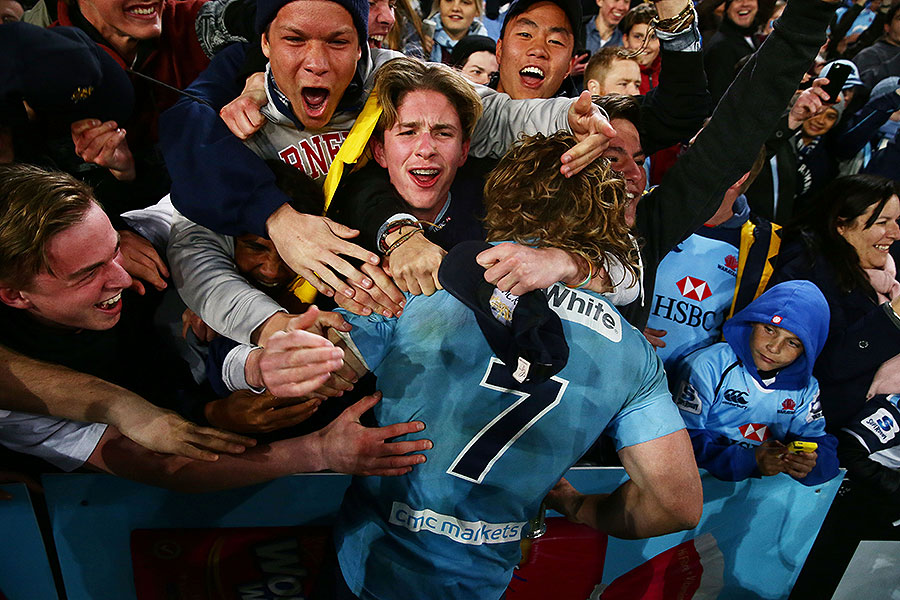
Michael Hooper celebrated the 2014 title with overjoyed Waratahs fans © Getty Images
Enlarge

Michael Cheika was the man who turned around the Waratahs © Getty Images
Enlarge

Adam Ashley-Cooper bagged a brace in the grand final
© Getty Images
Enlarge
The Game They Play in HeavenWe've seen some doozies in Super Rugby through the years, with the Crusaders seemingly involved in most of the best games with a real meaning, but the competition saved the best for latest: the Waratahs' maiden grand final triumph - against the Crusaders - produced perhaps the best game in Super history; what's more, the Tahs claimed their title triumph in front of a Super Rugby-record crowd at the sold-out ANZ Stadium in Sydney. To further gauge the interest in the final at the conclusion of a pulsating season, Fox Sports in Australia reported the match to be their second-best-rated Super Rugby broadcast of all-time (behind the 2011 Reds-Crusaders final) - representing a 53% increase on the Chiefs-Brumbies decider the previous year; the fixture also produced a 10% bigger TV audience in South Africa to illustrated the rude health of the tournament as it heads towards its next expansion. So it was fitting that New South Wales and the Crusaders produced a see-sawing contest that featured cut-a-dash attacking rugby and bellring-a-ding-dinging hits alongside the good old-fashioned rumble that excites the traditionalists; rugby already was the winner when Bernard Foley landed a last-minute penalty, conceded by Richie McCaw, from beyond his normal range to send New South Wales into ecstasy. The post-match sight and sound of overjoyed but long-suffering Tahs fans calling Michael Cheika's name like that of a messiah should live long into the memory - or at least until the Waratahs' first loss of form at home this season. What are your favourite Super Rugby memories? Let us know in the comments below, or by joining the conversation on Twitter using the hashtags #SuperRugbyMemories or #10For20
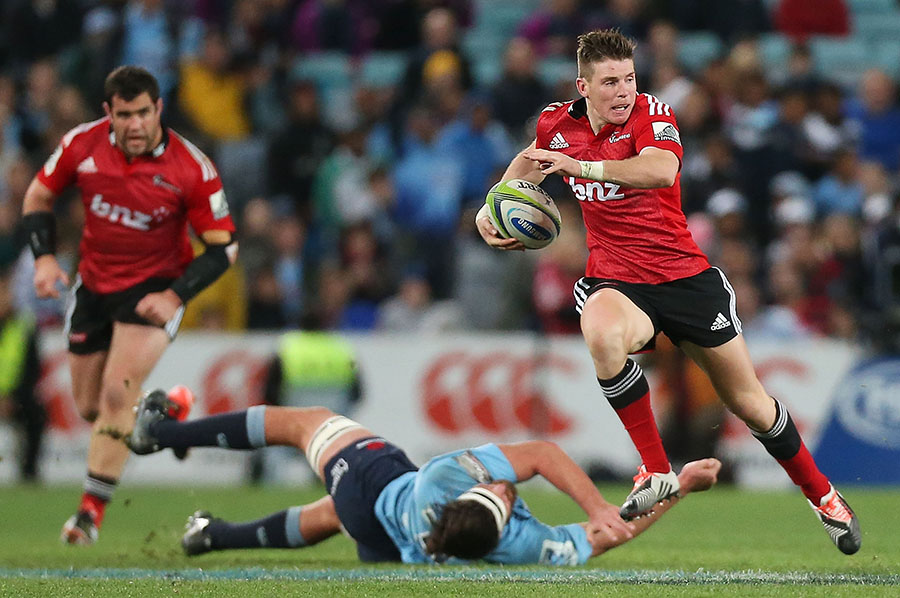
Colin Slade and the Crusaders played their full part in the 2014 grand final © Getty Images
Enlarge

The Super Rugby trophy © Getty Images
Enlarge
© ESPN Sports Media Ltd
|
Live Sports
Communication error please reload the page.
-
Football
-
Cricket
-
Rugby
-
- Days
- Hrs
- Mins
- Secs
F1 - Abu Dhabi GP
Abu Dhabi Grand Prix December 11-131. Max Verstappen ()
2. Valtteri Bottas (Mercedes)
3. Lewis Hamilton (Mercedes)
4. Alexander Albon ()
5. Lando Norris ()
6. Carlos Sainz Jr ()
-
ESPNOtherLive >>
Boxing - Nelson v Wilson; Simmons v Dickinson; Joshua v Gavern (Metro Radio Arena, Newcastle)
Golf - Houston Open
Snooker - China Open
Tennis - Miami Open

